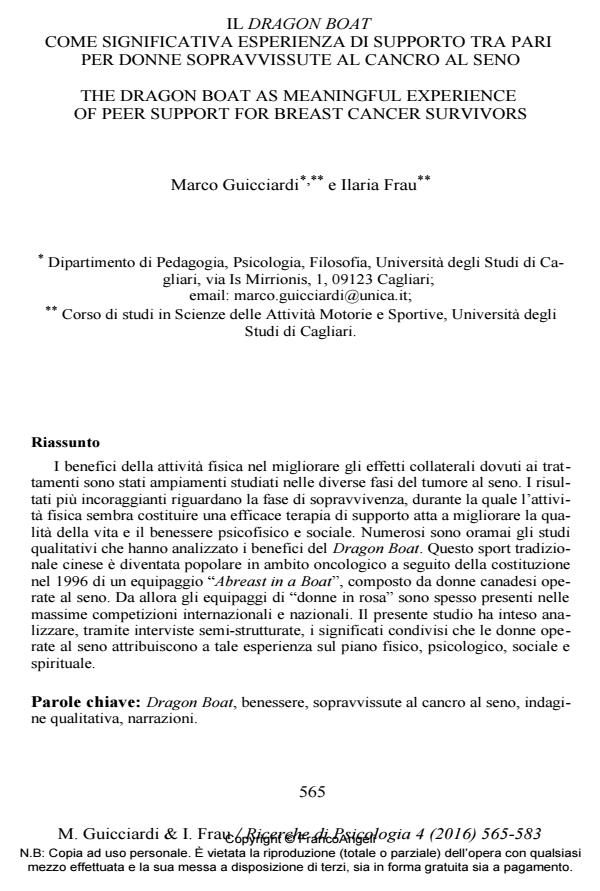The dragon boat as meaningful experience of peer support for breast cancer survivors
Journal title RICERCHE DI PSICOLOGIA
Author/s Marco Guicciardi, Ilaria Frau
Publishing Year 2017 Issue 2016/4 Language Italian
Pages 19 P. 565-583 File size 227 KB
DOI 10.3280/RIP2016-004006
DOI is like a bar code for intellectual property: to have more infomation
click here
Below, you can see the article first page
If you want to buy this article in PDF format, you can do it, following the instructions to buy download credits

FrancoAngeli is member of Publishers International Linking Association, Inc (PILA), a not-for-profit association which run the CrossRef service enabling links to and from online scholarly content.
The benefits of physical activity in improving the side effects of treatments have been widely studied in the different phases of breast cancer. The most encouraging results concern the survival phase, during which the physical activity appears to be an effective supportive therapy designed to improve the quality of life and the physical, mental and social well-being. There are numerous qualitative studies that have analysed the benefits of Dragon Boat. This traditional sport Chinese has become popular in oncology following the establishment in 1996 of a crew "Abreast in a Boat", made up of Canadian women breast surgery. Since then, the "Pink Teams" are often present in the national and international competitions. This study, using semi-structured interviews, analyses the shared meanings that breast cancer survivors, assign to this experience of physical, psychological, social and spiritual well-being.
Keywords: Dragon Boat, well-being, breast cancer survivors, qualitative inquiry, vignettes.
- Courneya, K. S., Blanchard, C. M., & Laing, D.M. (2001). Exercise adherence in breast cancer survivors training for a dragon boat race competition: a preliminary investigation. Psycho Oncology, 10(5), 444–452.
- Culos-Reed, S.N., Shields, C., & Brawley, L.R. (2005). Breast cancer survivors involved in vigorous team physical activity: psychosocial correlates of maintenance participation. Psycho-Oncology, 14(7), 594–605.
- De Backer, I.C., Schep, G., Backx, F.J., Vreugdenhil, G., & Kuipers, H. (2009). Resistance training in cancer survivors: a systematic review. International Journal of Sports Medicine, 30(10), 703-712.
- Hadd,V., Sabiston, C.M., McDonough, M.H., & Crocker, P.R.E. (2010). Sources of Stress for Breast Cancer Survivors involved in Dragon Boating: Examining Associations with Treatment Characteristics and Self-esteem. Journal of Women’s Health, 19, 1345-1353.
- Harris, S.R. (2012). We Are Alll in the Same Boat: A Review of the Benefits of Dragon Boat Racing for Women Living with Breast Cancer. Evidence-Based Complementary and Alternative Medicine, 2012, e167651. DOI: 10.1155/2012/167651
- Kim, J., Choi, W.J., & Jeong, S.H. (2013). The effects of physical activity on breast cancer survivors after diagnosis. Journal of Cancer Prevention, 18(3), 193-200.
- Lane, K., Jespersen, D., & Mckenzie, D.C. (2005). The effect of a whole body exercise programme and dragon boat training on arm volume and arm circumference in women treated for breast cancer. European Journal of Cancer Care, 14(4), 353–358.
- Maciulewicz-Gass, K. (2014). Exploring the body image and camaraderie experiences of breast cancer survivors in endurance sporting events.
- McCausland, L.L. (2010). Dragon boat racing: life after breast cancer treatment. The American Journal of Nursing, 110(10), 48-54.
- McDonough, M.H., Sabiston, C.M., & Crocker, P.R.E. (2008). An Interpretative Phenomenological Examination of Psychosocial Changes among Breast Cancer Survivors in their First Season of Dragon Boating. Journal of Applied Sport Psychology, 20(4), 425–440. DOI: 10.1080/10413200802241857
- McKenzie, D. C. (1998). Abreast in a boat--a race against breast cancer. CMAJ: Canadian Medical Association Journal = Journal de l’Association Medicale Canadienne, 159(4), 376-378.
- Mitchell, T., & Nielsen, E. (2002). Living life to the limits: Dragon boaters and breast cancer. Canadian Women’s Studies, 21, 50-57.
- Mitchell, T.L., Yakiwchuk, C.V., Griffin, K.L., Gray, R.E., & Fitch, M.I. (2007). Survivor dragon boating: a vehicle to reclaim and enhance life after treatment for breast cancer. Health Care for Women International, 28(2), 122–140. DOI: 10.1080/07399330601128445
- Parry, D.C. (2007). “There is Life after Breast Cancer”: Nine Vignettes Exploring Dragon Boat Racing for Breast Cancer Survivors. Leisure Sciences, 29(1), 53–69. DOI: 10.1080/01490400600983420
- Parry, D.C. (2008). The Contribution of Dragon Boat Racing to Women’s Health and Breast Cancer Survivorship. Qualitative Health Research, 18(2), 222–233. DOI: 10.1177/1049732307312304
- Ray, H.A., & Verhoef, M.J. (2013). Dragon boat racing and health-related quality of life of breast cancer survivors: a mixed methods evaluation. BMC Complementary and Alternative Medicine, 13, 205. DOI: 10.1186/1472-6882-13-205
- Sabiston, C.M., McDonough, M.H., & Crocker, P.R.E. (2007). Psychosocial experiences of breast cancer survivors involved in a dragon boat program: exploring links to positive psychological growth. Journal of Sport & Exercise Psychology, 29(4), 419-438.
- Shermak, S.L. (2008). Digging in, moving on: the experiences of breast cancer dragon boat paddlers. Master’s Thesis. University of British Columbia, 1-173.
- Smith, B. (2010). Narrative inquiry: ongoing conversations and questions for sport and exercise psychology research. International Review of Sport and Exercise Psychology, 3(1), 87-107. DOI: 10.1080/17509840903390937
- Speed-Andrews, A. E., & Courneya, K.S. (2012). Cancer Patients. In The Oxford Handbook of Exercise Psychology. Oxford University Press.
- Unruh, A.M., & Elvin, N. (2004). In the eye of the dragon: women’s experience of breast cancer and the occupation of dragon boat racing. Canadian Journal of Occupational Therapy. Revue Canadienne D’ergothérapie, 71(3), 138-149
Marco Guicciardi, Ilaria Frau, Il dragon boat come significativa esperienza di supporto tra pari per donne sopravvissute al cancro al seno in "RICERCHE DI PSICOLOGIA " 4/2016, pp 565-583, DOI: 10.3280/RIP2016-004006